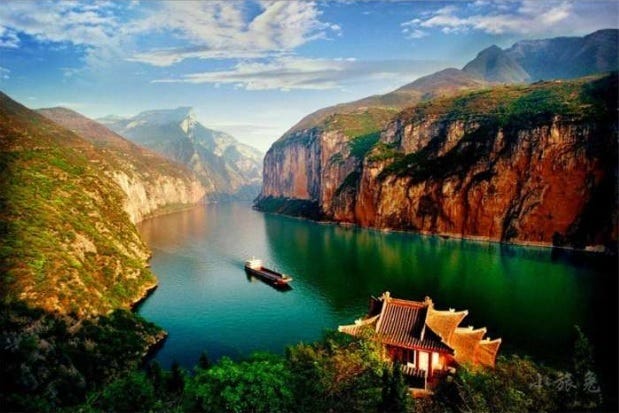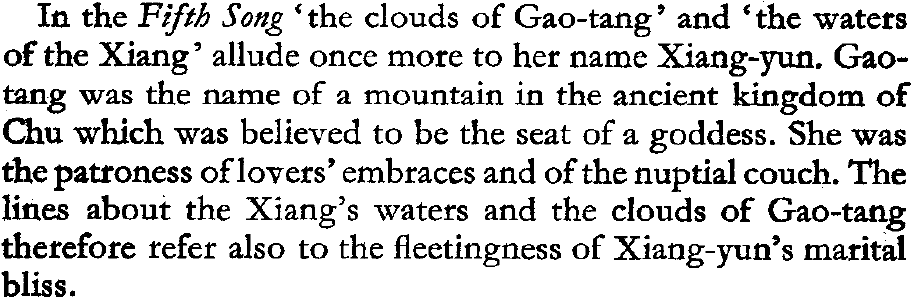The Clouds over Gaotang
The nice thing about translating in blog form is that I can stop and do a deep dive into interesting things that come along.
Traditional translations don’t allow for this. After all, you can only write so much in a book, and you’ll likely alienate your readers if you create a long string of footnotes. This is precisely why the common English translations of Dream of the Red Chamber (Story of the Stone by David Hawkes and A Dream of Red Mansions by Gladys Yang) shy away from explaning what “the clouds of Gaotang” refers to.
This is the difficult phrase in question:
終久是雲散高唐
In the end, the clouds over Gaotang scatter
Now, when you translate this, you can always just leave it the way it is. Indeed, my guess is that the average translator probably feels that there isn’t anything more you need to do here. A native speaker with a high level of education in traditional Chinese literature will probably assume that the reader already knows what “the clouds over Gaotang” refers to. A foreigner, meanwhile, might be curious about what this phrase means, but might not have the time or effort to go into more detail.
That’s exactly what David Hawkes does in the appendix to volume 1 of The Story of the Stone:
I’m not worried about the potential spoiler here, since we haven’t met the character David Hawkes is referring to yet. Rather, the interesting thing here is the somewhat nondescript and hurried way in which David Hawkes explains precisely what “Gaotang” means.
Like all good things in Dream of the Red Chamber, “Gaotang” is a reference to traditional Chinese literature. In fact, it is a reference to The Rhapsody on Gaotang (高唐賦) by Song Yu (宋玉).
You can find the complete text here. I’ll quote only the important bits below:
昔者楚襄王與宋玉遊於雲夢之臺,望高唐之觀。其上獨有雲氣,崒兮直上,忽兮改容,須臾之間,變化無窮。王問玉曰:「此何氣也?」
玉對曰:「所謂朝雲者也。」
Long ago, King Xiang of Chu and Song Yu wandered together atop the Cloud-Dream Terrace and gazed at the Gaotang Shrine. Above it, solitary clouds gathered, first towering like peaks, then shifting form, and finally transforming endlessly in the blink of an eye.
The King asked Song Yu: “What kind of mist is this?”
Song Yu replied: “This is called ‘Morning Cloud.’”
As you can see right away, the concept of clouds (雲) is tied directly with the word Gaotang (高唐). There’s more:
王曰:「何謂朝雲?」
玉曰:「昔者先王嘗遊高唐,怠而晝寢,夢見一婦人,曰:『妾巫山之女也,為高唐之客。聞君遊高唐,願薦枕席。』王因幸之。去而辭曰:『妾在巫山之陽,高丘之阻,旦為朝雲,暮為行雨。朝朝暮暮,陽臺之下。』旦朝視之如言。故為立廟,號曰『朝雲』。」
The King said: “What is ‘Morning Cloud’?”
Song Yu answered:
“Long ago, your ancestor king visited Gaotang. Weary, he took a nap one day and dreamed of a woman who said:
‘I am the daughter of Wu Mountain, a wanderer at Gaotang. Hearing you roam here, I offer to share your pillow.’
The king lay with her. At parting, she said:
‘I dwell where Wu Mountain’s southern slopes meet the high ridges.
At dawn, I am Morning Cloud;
At dusk, I am Wandering Rain.
Day after day, beneath the sunlit terrace.’
At dawn, he looked and saw it was so. Thus, he built her a shrine which he named ‘Morning Cloud.’”
We’ll stop there. The text goes on to describe the form of Morning Cloud in a lengthy poem.
Now, the obvious truth here is that the “Morning Cloud” and the “Wandering Rain” represents an ethereal, nonexistent dream.
And, as we’ve seen in yesterday’s poem, the “clouds of Gaotang” will inevitably scatter. Or, in other words, the king can search and search for the mythical woman of his dream as much as he likes — but he’s not going to be able to capture it.
In the end, the king’s quest to meet the mysterious Morning Cloud winds up being a symbol for pursuing eternal life, as the final line attests:
延年益壽千萬歲
May you live ten thousand years, with health and vigor unending
This, too, is an impossible wish and a task that cannot be realized.
So, in the poem we saw yesterday, the phrase “in the end, the clouds over Gaotang scatter” means that the dream of perfection simply cannot ever be actually achieved. And so the girl we saw in our poem yesterday might wish for the perfect husband to make up for her awful childhood, sure. The problem, though, is that her dream simply cannot come to pass. It’s unrealistic.




